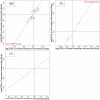Characterization of genetic loci that affect susceptibility to inflammatory bowel diseases in African Americans
- PMID: 26278503
- PMCID: PMC4685036
- DOI: 10.1053/j.gastro.2015.07.065
Characterization of genetic loci that affect susceptibility to inflammatory bowel diseases in African Americans
Abstract
Background & aims: Inflammatory bowel disease (IBD) has familial aggregation in African Americans (AAs), but little is known about the molecular genetic susceptibility. Mapping studies using the Immunochip genotyping array expand the number of susceptibility loci for IBD in Caucasians to 163, but the contribution of the 163 loci and European admixture to IBD risk in AAs is unclear. We performed a genetic mapping study using the Immunochip to determine whether IBD susceptibility loci in Caucasians also affect risk in AAs and identify new associated loci.
Methods: We recruited AAs with IBD and without IBD (controls) from 34 IBD centers in the United States; additional controls were collected from 4 other Immunochip studies. Association and admixture loci were mapped for 1088 patients with Crohn's disease, 361 with ulcerative colitis, 62 with IBD type unknown, and 1797 controls; 130,241 autosomal single-nucleotide polymorphisms (SNPs) were analyzed.
Results: The strongest associations were observed between ulcerative colitis and HLA rs9271366 (P = 7.5 × 10(-6)), Crohn's disease and 5p13.1 rs4286721 (P = 3.5 × 10(-6)), and IBD and KAT2A rs730086 (P = 2.3 × 10(-6)). Additional suggestive associations (P < 4.2 × 10(-5)) were observed between Crohn's disease and IBD and African-specific SNPs in STAT5A and STAT3; between IBD and SNPs in IL23R, IL12B, and C2orf43; and between ulcerative colitis and SNPs near HDAC11 and near LINC00994. The latter 3 loci have not been previously associated with IBD, but require replication. Established Caucasian associations were replicated in AAs (P < 3.1 × 10(-4)) at NOD2, IL23R, 5p15.3, and IKZF3. Significant admixture (P < 3.9 × 10(-4)) was observed for 17q12-17q21.31 (IZKF3 through STAT3), 10q11.23-10q21.2, 15q22.2-15q23, and 16p12.2-16p12.1. Network analyses showed significant enrichment (false discovery rate <1 × 10(-5)) in genes that encode members of the JAK-STAT, cytokine, and chemokine signaling pathways, as well those involved in pathogenesis of measles.
Conclusions: In a genetic analysis of 3308 AA IBD cases and controls, we found that many variants associated with IBD in Caucasians also showed association evidence with these diseases in AAs; we also found evidence for variants and loci not previously associated with IBD. The complex genetic factors that determine risk for or protection against IBD in different populations require further study.
Keywords: Ethnicity; Genetic Variant; Intestinal Inflammation; Race.
Copyright © 2015 AGA Institute. Published by Elsevier Inc. All rights reserved.
Figures




Comment in
-
Reducing colorectal cancer risk among African Americans.Gastroenterology. 2015 Nov;149(6):1302-4. doi: 10.1053/j.gastro.2015.08.033. Epub 2015 Aug 22. Gastroenterology. 2015. PMID: 26302487 Free PMC article. No abstract available.
-
Deciphering the genetic code of gastrointestinal diseases among African Americans.Gastroenterology. 2015 Nov;149(6):1323-6. doi: 10.1053/j.gastro.2015.09.029. Epub 2015 Sep 28. Gastroenterology. 2015. PMID: 26416331 Free PMC article. No abstract available.
References
-
- Parkes M, Cortes A, van Heel DA, Brown MA. Genetic insights into common pathways and complex relationships among immune-mediated diseases. Nat Rev Genet. 2013;14:661–673. - PubMed
Publication types
MeSH terms
Grants and funding
- U54DE023789-01/DE/NIDCR NIH HHS/United States
- U54 DE023789/DE/NIDCR NIH HHS/United States
- U01 DK062432/DK/NIDDK NIH HHS/United States
- UL1 TR000124/TR/NCATS NIH HHS/United States
- R01 HS021747/HS/AHRQ HHS/United States
- U01 DK062418/DK/NIDDK NIH HHS/United States
- AR-62278/AR/NIAMS NIH HHS/United States
- U01 DK062422/DK/NIDDK NIH HHS/United States
- DK062431/DK/NIDDK NIH HHS/United States
- M01 RR000032/RR/NCRR NIH HHS/United States
- P01 AR49084/AR/NIAMS NIH HHS/United States
- DK046763-19/DK/NIDDK NIH HHS/United States
- DK062422/DK/NIDDK NIH HHS/United States
- U01 DK062413/DK/NIDDK NIH HHS/United States
- M01-RR-00032/RR/NCRR NIH HHS/United States
- U24 DK062429/DK/NIDDK NIH HHS/United States
- N01 AR002247/AR/NIAMS NIH HHS/United States
- DK062423/DK/NIDDK NIH HHS/United States
- U01 DK062429/DK/NIDDK NIH HHS/United States
- HL06957/HL/NHLBI NIH HHS/United States
- DK062420/DK/NIDDK NIH HHS/United States
- AI067068/AI/NIAID NIH HHS/United States
- HS021747/HS/AHRQ HHS/United States
- U01 DK062423/DK/NIDDK NIH HHS/United States
- UL1 TR001417/TR/NCATS NIH HHS/United States
- DK087694/DK/NIDDK NIH HHS/United States
- DK062429/DK/NIDDK NIH HHS/United States
- U01 AI067068/AI/NIAID NIH HHS/United States
- P01 DK046763/DK/NIDDK NIH HHS/United States
- P01 AR049084/AR/NIAMS NIH HHS/United States
- DK062432/DK/NIDDK NIH HHS/United States
- DK062413/DK/NIDDK NIH HHS/United States
- U01 DK062420/DK/NIDDK NIH HHS/United States
- U01 DK062431/DK/NIDDK NIH HHS/United States
- R01 DK087694/DK/NIDDK NIH HHS/United States
LinkOut - more resources
Full Text Sources
Other Literature Sources
Molecular Biology Databases
Research Materials
Miscellaneous

